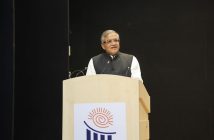In Bihar, a storm brews as political strategist Prashant Kishor labels Chief Minister Nitish Kumar “physically and mentally unfit” to lead, pointing to a spiraling law and order crisis. With crime rates soaring—320,000 FIRs in 2024—and high-profile police killings rocking the state, Kishor’s accusations have ignited a fierce debate. As opposition parties demand Kumar’s resignation and residents lose faith in law enforcement, the upcoming Bihar elections loom large. Can Kumar restore order, or is his leadership faltering?
The streets of Bihar hum with tension. From bustling Patna to rural hamlets, whispers of discontent grow louder. At the center of this unrest is Prashant Kishor, the sharp-tongued political strategist and founder of the Jan Suraaj Party, who has launched a scathing attack on Chief Minister Nitish Kumar. Labeling Kumar “physically and mentally unfit” to govern, Kishor points to a deteriorating law and order situation that has left residents fearful and emboldened opposition parties. With crime rates climbing and public trust eroding, Kishor’s allegations have set the stage for a high-stakes political showdown as Bihar approaches its assembly elections.
The Allegations: Kishor’s Case Against Kumar
Prashant Kishor, once a trusted strategist for Nitish Kumar’s Janata Dal (United), has turned critic. His latest salvo came after Kumar’s absence from a recent Niti Aayog meeting in New Delhi, which Kishor attributed to the 71-year-old CM’s declining health and cognitive abilities. “How can a man who struggles to recall his cabinet members without notes lead a state of 130 million?” Kishor asked during a rally in Muzaffarpur, his voice cutting through the humid air. He accused Kumar of prioritizing political alliances, particularly with the BJP-led NDA, over addressing Bihar’s pressing issues.
Parshant Kishor’s claims aren’t just personal. He argues that Kumar’s leadership has failed to curb a rising tide of crime, from petty thefts to brutal murders. “There’s no accountability,” Kishor told supporters in Patna. “The CM is distracted, and Bihar is paying the price.” His remarks have struck a chord with many, but they’ve also drawn sharp rebuttals from Kumar’s allies, who dismiss Parshant Kishor as a publicity seeker.
A State Under Siege: The Law and Order Crisis
Bihar’s law and order situation paints a grim picture. According to the National Crime Records Bureau (NCRB), the state recorded over 320,000 First Information Reports (FIRs) in 2024, a 12.3% jump from 285,000 the previous year. Crimes against women, including assault and domestic violence, rose by 12%, with 34,000 cases reported in 2024 alone. These numbers tell a story of a state grappling with insecurity.
High-profile incidents have only deepened the crisis. In early 2025, two police officers were gunned down in separate incidents within 72 hours in Darbhanga and Siwan districts. The killings, linked to local criminal gangs, sent shockwaves through Bihar, prompting protests by police unions and residents. “We don’t feel safe anymore,” said Sunita Devi, a shopkeeper in Patna’s Kankarbagh area, where thefts have surged. “The police take hours to respond, if they come at all.”
Local leaders echo these concerns. In Gopalganj, a district head reported a 15% increase in violent crimes, including armed robberies, over the past year. Delayed police response and understaffed stations—many operating at 60% capacity—have left communities vulnerable. The opposition, led by the Rashtriya Janata Dal (RJD) and Congress, has seized on these failures, demanding Kumar’s resignation. “This is not governance; it’s chaos,” said RJD leader Tejashwi Yadav during a press conference in Patna.
Nitish Kumar’s Defense: Promises Amid Pressure
Nitish Kumar, a veteran politician who has led Bihar for nearly two decades, has pushed back against the criticism. Speaking at the Bihar Legislative Assembly in February 2025, he insisted that law and order remain his government’s “top priority.” “Whenever a major incident occurs, I ensure swift action,” Kumar said, his voice steady but strained. He pointed to recent arrests in the police killings as proof of his administration’s resolve.
Parshant Kumar’s government has also touted investments in law enforcement, including plans to recruit 20,000 new police officers by 2026 and install 10,000 additional CCTV cameras across urban areas. Yet, critics argue these measures are too little, too late. “Announcements don’t stop bullets,” said Congress leader Akhilesh Singh, referencing the state’s failure to prevent recurring violent crimes.
A Clash in Kalyan Bigha: Kishor’s Campaign Faces Resistance
The feud between Parshant Kishor and Kumar took a dramatic turn in March 2025 when police stopped Kishor from entering Kumar’s native village, Kalyan Bigha, in Nalanda district. Kishor planned to launch a signature campaign to highlight administrative failures, but authorities barred his entry, citing “law and order concerns.” Kishor called the move a “political stunt,” accusing the government of stifling dissent. “If they’re so confident in their governance, why fear a simple campaign?” he asked supporters via a post on X.
The incident underscored Kishor’s growing influence as a thorn in Kumar’s side. His Jan Suraaj Party, though new, has gained traction among young voters and disillusioned citizens. Through rallies and social media, Kishor has painted a vivid picture of a state plagued by “mafias and criminal elements,” from sand mining syndicates to organized crime networks. His rhetoric resonates in rural areas, where farmers and small business owners feel neglected by the government.
Political Ripples: Allies and Adversaries Respond
Parshant Kumar’s allies have hit back hard. Bihar Health Minister Mangal Pandey dismissed Kishor’s criticisms as “desperate attention-seeking.” “He’s a strategist, not a leader,” Pandey said at a press briefing in Patna. “Bihar’s progress under Nitish Kumar speaks for itself.” The ruling Janata Dal (United)-BJP coalition cites infrastructure projects, such as new highways and rural electrification, as evidence of Kumar’s legacy.
But political analysts see trouble brewing. “Kishor’s attacks are resonating because they tap into real grievances,” said Dr. Sanjay Kumar, a Patna-based political scientist. “Crime statistics don’t lie, and people feel the impact daily.” The upcoming Bihar assembly elections, expected in late 2025, will likely hinge on issues of governance and public safety. Kishor’s Jan Suraaj Party, though untested, could disrupt the traditional RJD-JDU-BJP contest, especially if voter frustration continues to mount.
The Bigger Picture: Bihar’s Future at Stake
Bihar’s law and order crisis is more than a political talking point; it’s a human tragedy. In Bhagalpur, a 22-year-old woman was assaulted in broad daylight in January 2025, with bystanders too scared to intervene. In Muzaffarpur, a string of extortion cases targeting small businesses has driven some shopkeepers to shutter their stores. These stories, coupled with NCRB data, paint a picture of a state struggling to balance growth with security.
Parshant Kishor’s allegations about Kumar’s fitness add a personal dimension to the debate. While Kumar has not publicly addressed health concerns, his absence from key events and reliance on aides have fueled speculation. “Voters want a leader who’s present, not just in office but in action,” said Dr. Kumar. “Kishor is betting on that sentiment.”
The broader implications are stark. Bihar, one of India’s poorest states, has made strides in education and infrastructure under Kumar’s tenure. But persistent crime and governance challenges threaten to undo that progress. If public trust continues to erode, the state risks slipping into deeper instability, with economic and social consequences.
Looking Ahead: A State at a Crossroads
As Bihar heads toward its next elections, the battle lines are clear. Prashant Kishor’s unrelenting criticism has thrust Nitish Kumar’s leadership—and the state’s law and order crisis—into the spotlight. For Kumar, the challenge is to prove he can still deliver the stability Bihar craves. For Kishor, it’s about convincing voters that his Jan Suraaj Party offers a viable alternative.
The numbers are sobering: a 12% rise in crimes against women, 320,000 FIRs, and a public increasingly skeptical of law enforcement. Yet, the story isn’t just about statistics. It’s about people like Sunita Devi, who locks her shop early out of fear, and families in Kalyan Bigha who wonder if their leaders are listening. As the election looms, Bihar stands at a crossroads. Will Kumar’s experience prevail, or will Kishor’s call for change ignite a new era? Only time—and the voters—will decide.




